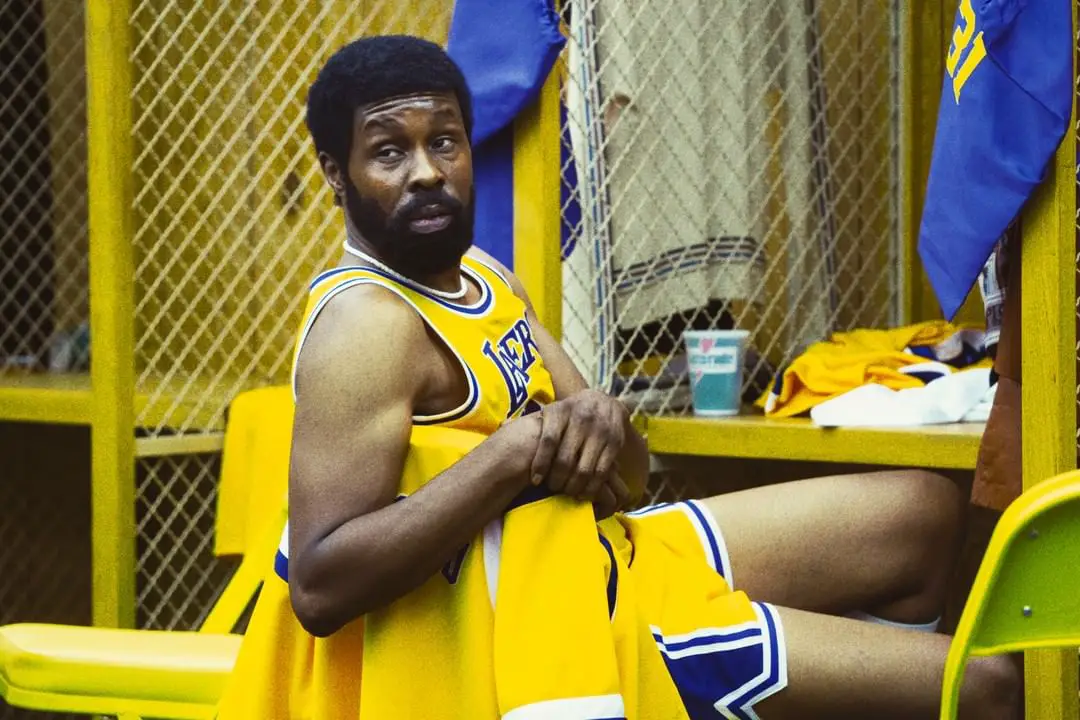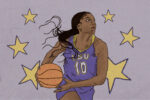When COVID-19 confined viewers to their homes in March 2020 and subsequently stole the pleasure of watching live sports from millions, viewers around the world huddled around their televisions. Many relieved their sports-itch with “The Last Dance,” a highly entertaining docu-series that detailed Michael Jordan’s storied career with the Chicago Bulls.
Sports have returned in the near two years since “The Last Dance” last aired on ESPN, but the void of riveting sports television remained. With HBO’s new hit series, “Winning Time: The Rise of the Lakers Dynasty,” that all changed. Once again, viewers have a chance to be captivated by a story about one of basketball’s most iconic teams, the Showtime-era Lakers.
Mainly focusing on dramatizing and retelling the stories of Lakers owner Jerry Buss, NBA legend Earvin “Magic” Johnson and coach/front office executive Jerry West, the show’s plot provides some wildly entertaining highs intertwined with some cringe lows. But before we dive into the profoundly controversial plot, let’s talk about what the show has nailed through eight episodes.
Casting
John C. Reilly has flexed his comedic muscles before in classic movies like “Step Brothers” and “Talladega Nights” while also proving himself capable in more dramatic settings like “Magnolia.” That being said, Reilly’s masterful portrayal of Jerry Buss is possibly his most enjoyable work to date, as his flair for both drama and comedy mesh together beautifully for “Winning Time.” Every line is entirely believable, and he brings an energy to Buss’ character.
Beyond just Reilly, it’s awe-inspiring how producer/director Adam McKay managed to find actors that possess supreme acting chops and closely resemble the real-life athletes they portray. Like Keanu Reeves in “The Replacements,” directors can hilariously shoot themselves in the foot and put their work in serious jeopardy with poor casting. That doesn’t happen here. Sean Patrick Small is a near look-alike of Larry Bird and has his cold demeanor perfected.
Quincy Isaiah’s smile feels as infectious as Magic Johnson’s, which is pivotal and certainly didn’t happen by accident. And seriously, look at the side-by-side of Kareem Abdul Jabbar and actor (and former California University basketball player) Dr. Solomon Hughes, who’s killing his on-screen debut in front of millions. Hughes’ basketball background, 6′ 10″ frame and the thoughtfulness he’s put into portraying Kareem’s notoriously nuanced personality have helped him become one of the more enjoyable elements of the entire series.
Cinematography
Beyond casting, the cinematography of “Winning Time” is top-notch and provides the series with further depth. I know that descriptions of cinematography are probably overused in film criticism; still, cinematographers Todd Bahnazl and Mihai Malaimare Jr. noticeably switch between different camera types and formats to emphasize the ’70s and ’80s vibe. This technique is unique and compelling.
The viewer can watch the drama unfold from a modern camera, then suddenly be jolted into 1980s-style grainy footage. Executive producer Max Borenstein said the original plan was only to shoot basketball scenes this way. Still, the style brings a “layered feel of what we’re accustomed (to) seeing in a documentary into the world of a dramatic series so that we can take an audience in a kind of time machine.” I couldn’t agree more.
The series’s eternal love affair with breaking the fourth wall must also be discussed. The technique is Adam McKay’s calling card, but I’m not sure audiences enjoy it as much as he might think. Sure, it’s hilarious at times — like when Nike founder Phil Knight looks into the camera with a sly look and says, “He regrets it,” after a chyron shows that Magic Johnson missed a $5.2 billion opportunity by not signing with Nike.
That’s precisely the thing; it’s funny, but the audience doesn’t need Phil Knight looking into the camera and saying it to understand that Magic might have regrets. It feels excessive at times, almost like the show’s creators have punted on showing and not telling; for instance, four characters break the fourth wall in the first 15 minutes of the opening episode. It’s helpful when explaining a complicated aspect of the show, like the Lakers’ finances, but maybe dial it back next season.
Controversial Plot Elements
Despite this aspect, the plot of “Winning Time” is easily entertaining enough to make up for it. But not everyone agrees, and the people portrayed on-screen have made their feelings known about the show’s tendency to switch from fact to fiction. Jerry West — who’s depicted as an obsessed, perpetually angry former player with a slight alcohol problem — has even threatened to take the show’s creators to the Supreme Court.
“The series made us all look like cartoon characters,” West told The New York Times. His lawyers were more pointed, writing this to HBO: “You replaced the real Jerry West — a consummate professional — with his polar opposite, then portrayed this lie to the public as genuine. You thereby broke the law.”
In turn, HBO responded to West’s legal team with a reminder that “Winning Time” is, in fact, a dramatization of real-life events. “‘Winning Time’ is not a documentary and has not been presented as such,” the statement reads. “However, the series and its depictions are based on factual research and reliable sourcing, and HBO stands resolutely behind our talented creators and cast who have brought a dramatization of this epic chapter in basketball history to the screen.”
Listen, it’s understandable why West in particular feels wronged by his portrayal. The most significant issues with the show are undoubtedly the cringey and unrealistic plot points involving his character, which knowledgeable viewers will have a hard time believing.
For instance, there’s no way Jerry West would have been that opposed to drafting future Hall of Famer Magic Johnson. Nor would he have been on his knees in Jerry Buss’ office saying “he’d die” to play again when discussing his coaching shortcomings. However, the broader critiques from former players like West and Kareem Abdul-Jabbar, who labeled the show “dull” in his piece about it, are just wrong. The show is fun and keeps viewers excited for next week’s episode because it’s entertaining and well-written.
So if you’re looking for a documentary, don’t expect that from “Winning Time.” There are plenty of options in that realm, including the newly released “They Call Me Magic” on Apple TV+. But if you’re looking for entertainment while simultaneously entering a world of delightful nostalgia, “Winning Time” is the right show to see.
















